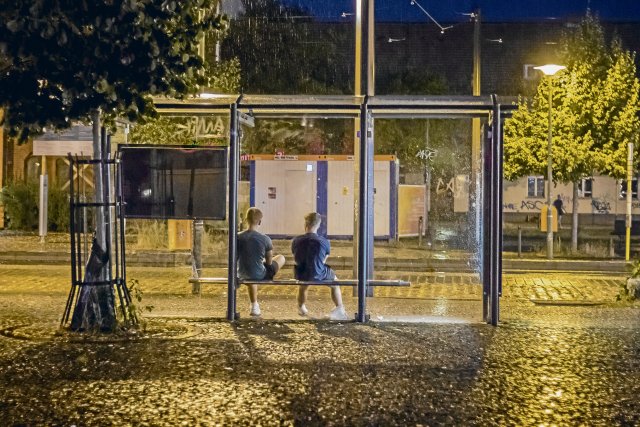Wait, wait, wait – in the small town and in the youth. The only question is: what for?
Photo: Photocase/WWeiser
It is an almost Kafkaesque scenario that the German studies student Arda describes in Necati Öziri’s debut novel “Father’s Mark” in a letter to his absent father Metin. He talks about the same old visits to the immigration office, about waiting for hours in crowded hallways, only to have to keep waiting for the next appointment after the same official conversations, which are always only in the third person. Or as Kafka might say: Arda and his sister must have done something wrong because even though they were born here, went to school and their mother worked here, they didn’t get a German passport. Unfortunately they don’t have a Turkish one either because their father was politically persecuted there.
The lack of a passport is a fitting image for all people with migration experience who find it increasingly difficult to belong somewhere – regardless of whether they have no passport at all or seven worthless ones, like Arda’s friend Bojan, who fled Yugoslavia with his mother. And it is a fitting image for this lack of belonging that the narrator, Arda, is dying with an autoimmune disease, so not even his own body recognizes him.
The only thing that helps is telling. So that Metin never finds himself in the position of knowing as little about his dead son as he knows about him, Arda writes down his life without him. And this also combines what his mother Ümran and his sister Aylin tell him in the hospital, who no longer speak to each other since Aylin ran away from home ten years ago.
Ümran came to Germany with her family from Turkey as a child after they lost everything in a severe earthquake and her father soon died. At some point she meets Metin, who fled Turkey after the military coup because he wanted to avenge his brother’s death. She gets pregnant, gets married, and starts working at McDonalds shortly after Aylin’s birth because Metin has gambled away her entire savings. When she is pregnant with Arda, he leaves her and goes back to Turkey because he even prefers prison to a life as an exile and butcher shop worker.
Ümran starts drinking and becomes estranged from her daughter, who is deported to live with her grandmother. After her mother beats her, Aylin runs away for good, lives with various foster parents, is driven through life until she eventually finds happiness in life with, of all people, a policewoman.
For Arda, this seems completely absurd, as he lived most of the time on a collision course with the law, while he sat with his buddies in the train station square of his small town without a passport and sold drugs. This is where his text finds its strongest voice, when he uses his “accent-free self” to talk about last summer with his friends, where the experiences of racism of a fragile migrant masculinity in abject poverty combine with the simple joys of small-town life and merge for the last time in innocence of a childhood friendship.
Arda tells about Savaş, his oldest childhood friend and the son of a Metin comrade. He is often prone to riots and goes to Turkey after an accident. Danny, on the other hand, is “a perfectly normal potato, just with a broken mother, and that makes him a bit of a jerk.” He becomes a father far too early and follows his lover to Poland. Bojan not only has seven passports (none of them German), but also speaks seven languages. After he is beaten up outside a nightclub, he and his mother are deported.
In the seemingly casual description of big dramas, small and medium-sized gangsters, secret dates and aimless hanging around, the otherwise sober, observational tone of the narrative regularly breaks down and takes on the urgency that the blurb promises. These are also the moments in which speaker Eray von Ergilmez, with his warm baritone, particularly enjoys immersing himself in the upscale street sound with plenty of Turkish pieces in the audio book version.
“Father’s Mark” was once a theater text that Öziri wrote for Berlin’s Maxim-Gorki under the title “Get German or die tryin’.” The journey from becoming a novel to being nominated for the German Book Prize (shortlist) is an unusual path; the texts usually take the other direction.
“Father’s Mark” is also a good counterpart to Özge İnan’s debut “Of course you can’t live here”, which tells the fate of Turkish intellectuals after the military coup and before emigration. While the protagonists in İnan always maintain an astonishing sovereignty over their life paths, the characters in “Fathermark” appear much more like driven people, just as – to paraphrase Goethe – “we are all just shitty guest workers in this world”.
It’s a wild, long road until Arda finally has the right to become an “official potato” on his 18th birthday, and the Kafkaesque immigration office dissolves into adventurous comedy. But even as a German student, as the illness represents, his life will remain precarious. He can hope to win it through telling stories even more than through blood plasmapheresis.
Necati Öziri: Vatermal. Claassen, 308 S., born, €25.
nd.Christmas promotion
This will be a celebration: give away nd.Digital
Give away the Superfair digital campaign subscription for 59.40 euros (9.90 euros/month).
6 months of reading »nd« digitally in the nd.App and as nd.Epaper. The subscription ends automatically.
dasnd.de/weihnachtsaktion
